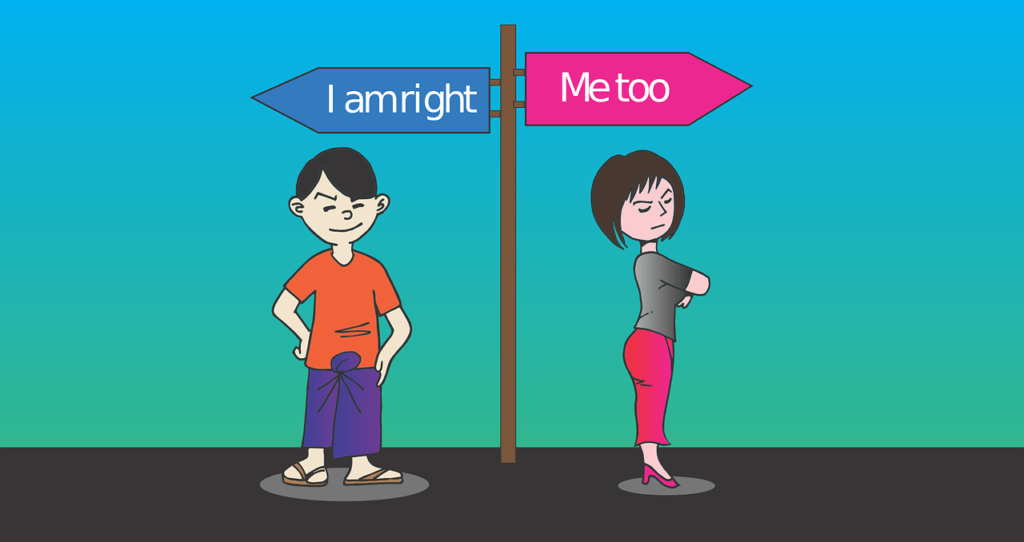Conflict in a relationship is inevitable. Whether it be because of differing opinions or life events that cause stress, you will have to learn how to resolve conflicts with your partner. This blog post will teach you what conflict is and why it’s healthy for relationships, as well as how to resolve (reduce) conflicts in your relationship. Learning these skills will help you maintain a happy and healthy partnership!
Contents
- 1 What It Is To Have Conflict In A Relationship?
- 2 What Are The Types Of Conflicts In A Relationship?
- 3 What Are The Potential Causes Of Conflicts?
- 4 How To Resolve A Mild Conflict In A Relationship?
- 5 How To Resolve A Serious Conflict In A Relationship?
- 6 A Few Common Things To Keep In Mind
- 6.1 Express how you’re feeling and why
- 6.2 Try not to interrupt
- 6.3 Try to be calm
- 6.4 Don’t try everything once
- 6.5 No name-calling
- 6.6 Take a break
- 6.7 Listen to what your partner is saying
- 6.8 Don’t bring up the past
- 6.9 Focus on what you can do going forward
- 6.10 Don’t try to change them
- 6.11 Be willing to compromise
- 6.12 Be open-minded about your partner’s perspective
- 6.13 Remember that everything is ok!
- 6.14 Be confident in yourself and what you need/want from your relationship
- 6.15 Practice communicating with your partner
- 7 When Should You Get Help?
- 8 When Can Conflicts Turn Into The End Of A Relationship?
- 9 Relationship Coaches On Resolving Conflict In a Relationship
- 10 Conclusion
What It Is To Have Conflict In A Relationship?
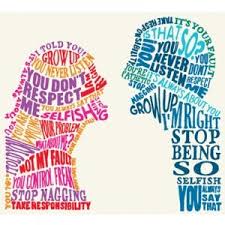
Conflict in a relationship is simply any disagreement, argument, or fight between you and your partner. It can be something small, like who does the dishes tonight, or something big, such as how to handle a family crisis.
Are Conflicts Healthy In A Relationship?
Conflicts are a normal and healthy part of any relationship. They allow you to communicate with your partner, resolve disagreements, and learn more about them. Without conflicts, you may not be able to identify issues that need to be addressed to make the relationship stronger.
What Are The Types Of Conflicts In A Relationship?
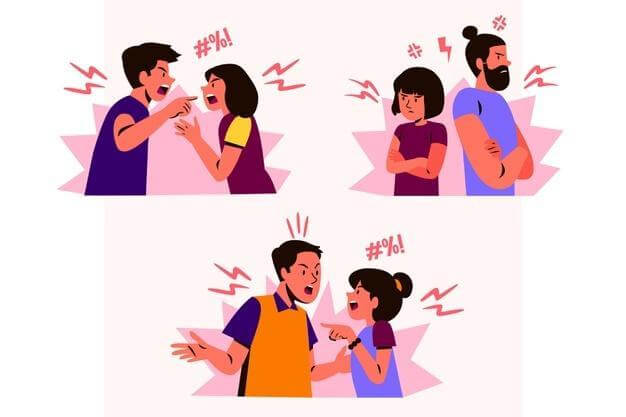
Types Of Conflict (Based On Degree)
Conflicts in a relationship can be mild or serious, and it is important to recognize the difference between these two types of conflicts.
Mild Conflicts
Mild conflicts are disagreements that can be resolved quickly and easily. They generally involve small issues that can be solved by communicating with your partner. They don’t have any effect on your partner’s feelings towards you.
- You can resolve them tactfully without professional help.
Serious Conflicts
Serious conflicts are disagreements that cannot be easily resolved. They tend to involve bigger issues, such as those about the relationship itself or major life events. They have the potential to pose damage to trust in a relationship. They typically affect someone’s mood negatively or cause one person to lose respect for the other.
- These types of conflicts often require the help of a relationship coach or therapist.
Types Of Conflicts (Based On Nature)
There are many different types of conflicts that can happen in a relationship. The following are some of the most common:
Money Issues
Arguments about money are one of the most common causes of conflict in relationships. This is often due to differing opinions on how money should be spent or saved.
Infidelity
Cheating is another major cause of conflict in relationships. When one partner is unfaithful, it can lead to a lot of pain and anger.
Household Chores
Disagreements about household chores are also common in relationships. This often happens when one person feels like they’re doing more than their fair share.
Parenting Decisions
Arguments about parenting decisions can be some of the most difficult to resolve. When parents disagree, it can often lead to stress and tension in the home.
Personal Values And Beliefs
Conflicts about personal values and beliefs can be some of the most challenging to resolve. This is because they are often tied to our deepest convictions
Sex Or Intimacy
Disagreements about sex or intimacy can be a major source of tension in a relationship. This is often due to differing needs or desires.
Friends And Family Members
Conflicts with friends and family members can also be a major source of tension in a relationship. This is often due to disagreements about how much time should be spent with them.
What Are The Potential Causes Of Conflicts?
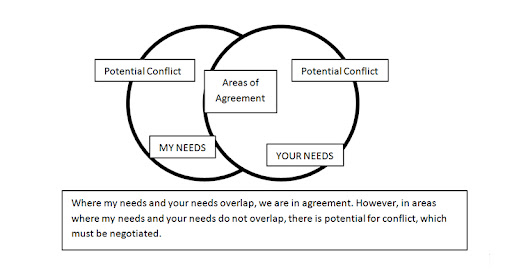
While the conflict in a relationship is inevitable, there are many different potential causes of conflicts. The following list covers some common and less common reasons for why conflicts arise:
- Dealing with a stressful life event together
- Having differing values or beliefs from your partner
- Being around other people that have a negative influence on you or your partner’s actions (e.g. family members, friends)
- Having differing ideas about what you want to do in the future (e.g., where to live or go on vacation )
- One partner feels under-appreciated while the other one is overly demanding of them
How To Resolve A Mild Conflict In A Relationship?
Mild conflicts in a relationship can be resolved relatively easily if both parties are willing to compromise. The following tips will help you and your partner resolve a conflict in a healthy manner.
Communicate!
Don’t assume that your partner will know why you’re angry or upset without you telling them. If it is something they did, then tell them exactly what they did and how it made you feel. This may seem like common sense, but many couples don’t do this because of pride or fear of judgment.
Avoid Insults
Don’t resort to name-calling or insults during a conflict. This will only make the situation worse and can damage your relationship beyond repair.
Hear Them Out
Make sure that you are listening to what your partner is saying. If you’re busy formulating a response, then you are not listening to them.
Let Bygones Be Bygones
Don’t bring up past conflicts in current ones. This will only prolong the argument and make it harder for your partner to hear what you’re saying.
No Physical Violence
Do not resort to physical violence or threats of doing so during a conflict with your partner. This is never an acceptable way to handle a disagreement.
Let It Cool Down
Take some time to cool down after an argument before trying to resolve it. This will allow you to communicate more effectively with your partner and avoid saying things that you may regret later on.
How To Resolve A Serious Conflict In A Relationship?
Serious conflicts in a relationship are much harder to resolve and often require the help of a third party. The following tips will help you and your partner begin to repair the damage that has been done.
Seek Professional Help
If you and your partner are struggling to resolve a serious conflict in your relationship, then it may be a good idea to go see a professional. A marriage and family therapist will be able to help you and your partner resolve issues through constructive discussion and communication.
Avoid Arguing In Public
Arguments should only happen when both parties are feeling calm enough for healthy dialogue. If an argument is escalating into shouting and insults, then it is best to step away and resolve the conflict in a private setting.
Avoid Blaming Your Partner
Try not to place all of the blame on your partner. If they are at fault for causing the argument, then you should take responsibility as well. This will help them open up more during communication about what caused the disagreement.
Don’t Stress Your Partner Out
Never go to bed angry with your partner. This will only make it easier for them to avoid talking about the conflict and harder for you to resolve. Try not to escalate a serious argument into an all-night discussion as this can cause stress on both of you.
Be Aware Of Triggers In Your Relationship
Triggers are things that can cause a conflict to arise in your relationship. If you and your partner are aware of what these triggers are, then it will be easier for you to avoid them or diffuse the situation before it gets out of hand.
A Few Common Things To Keep In Mind
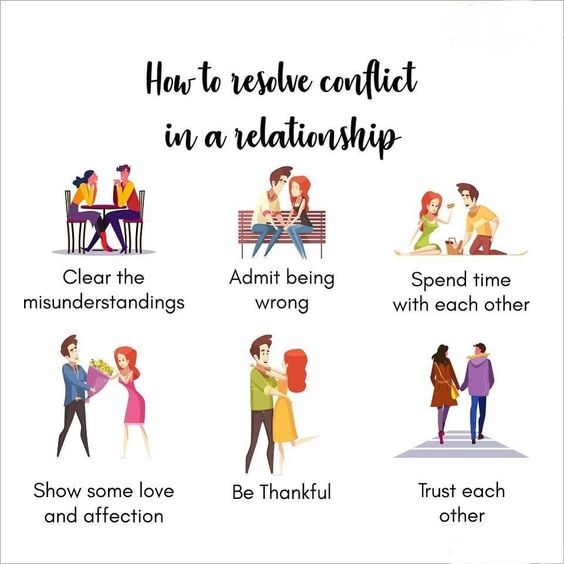
There are many different ways that you can try to resolve the issue. The following list provides 15 tips/strategies for resolving conflicts in a relationship:
Express how you’re feeling and why
Don’t bottle up your feelings! If something is bothering you, let your partner know so that they can try to resolve it.
Try not to interrupt
When your partner is speaking, don’t jump in and start talking before they’re done! If you feel the need to interject something into their sentence, then ask them a question instead of adding what you want at the same time as them.
Try to be calm
Sudden outbursts of emotion are not helpful during a conflict. Try your best to stay as calm as possible so that you can have an adult conversation with your partner about the issue at hand. This will help them open up more, too!
Don’t try everything once
Both parties in a conflict need to be willing to try different things to resolve the issue. If one side is not trying at all, then it will be difficult for the conflict to be resolved.
No name-calling
Name-calling and insults only serve to escalate a conflict and make it harder for both parties involved to reach a resolve
Take a break
If things are getting too heated, take a break from the discussion. This will give you and your partner some time to calm down and approach the conflict with a more level head.
Listen to what your partner is saying
It can be easy for us to get wrapped up in our thoughts during a disagreement, but both parties need to be able to listen to what their partner is saying and try to understand where they’re coming from.
Don’t bring up the past
Arguments should always stay in the present tense! If you find that your argument has veered into territory about something that happened before, then steer it back towards how you feel now. This will help keep the argument grounded in a productive manner.
Focus on what you can do going forward
Arguments should be about how both parties involved are feeling right now and what they want moving forward. This will help give your partner an idea of where to take things from here, which is often more helpful than dwelling on the past.
Don’t try to change them
You cannot control how your partner thinks or feels, so do not attempt to use conflict resolution as a means of changing your mind.
Be willing to compromise
Both parties involved in an argument need to be open and willing for the other person’s perspective for both sides to feel heard. If you are not willing to compromise, then it will be difficult for you to resolve the conflict.
Be open-minded about your partner’s perspective
It can sometimes be hard to see things from another person’s point of view when we disagree with them, but try and put yourself in their shoes! This is a great way to understand where they’re coming from and resolve the conflict more easily.
Remember that everything is ok!
Your relationship does not end because of one argument; it takes many different conflicts for your partner to decide they want out if they do at all.
Be confident in yourself and what you need/want from your relationship
If you know exactly where you stand with your partner, then you will feel more confident in your ability to resolve conflicts.
Practice communicating with your partner
The best way to practice conflict resolution is by practicing communication! If both parties can communicate effectively and know how to have an adult conversation about their feelings, then it’s much easier for them to resolve the issue at hand.
When Should You Get Help?

If you find yourself arguing with your partner more than usual and feel like it may be time to end your relationship, then get help immediately. There is nothing wrong with seeking help from a professional if you feel like the conflict has become too much to handle.
When Can Conflicts Turn Into The End Of A Relationship?

Conflict is healthy in a relationship, but it becomes unhealthy when either partner feels intense emotions during or after an argument. When you feel intense emotions like anger, sadness, resentment, or betrayal towards your partner over something they said/did during conflict resolution, it can lead to the end of a relationship. Relationship coaches recommend seeking professional help if you find yourself in this situation often.
Relationship Coaches On Resolving Conflict In a Relationship
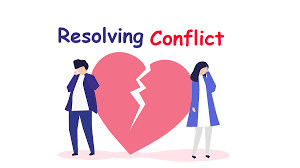
A conflict in a relationship can be resolved quickly and easily if both partners are willing to compromise. Relationship coaches recommend taking some time apart, apologizing for your actions during the argument, and thinking about what you want from the future. They also recommend staying calm during any conflicts with your partner because it will make them feel more valued by their opinion of matters.
Conclusion
Conflict is an inevitable part of any relationship, but it doesn’t have to be destructive. By using the tips/strategies provided in this blog post, you and your partner can learn how to resolve conflicts healthily. If you find that these strategies don’t work for your relationship, then consider seeking the help of a professional to ensure that it doesn’t lead to the end of your relationship.
For more information, please contact MantraCare. Relationships are an essential part of human life. It is the connection between people, and it helps us to form social bonds, understand and empathize with others. If you have any queries regarding Online Relationship Counseling experienced therapists at MantraCare can help: Book a trial therapy session
